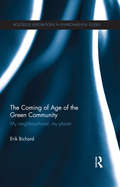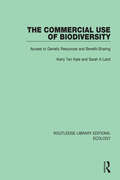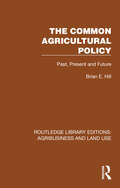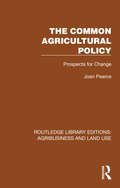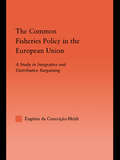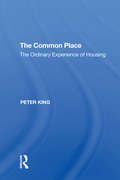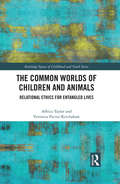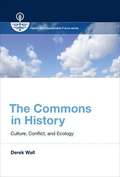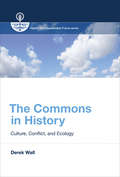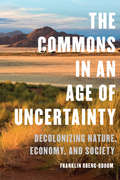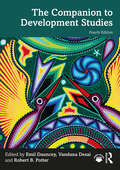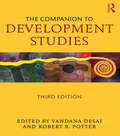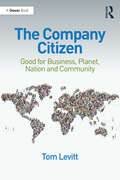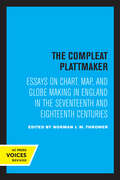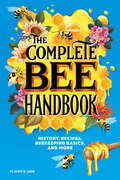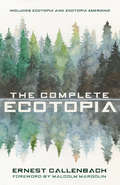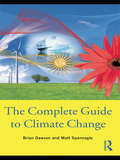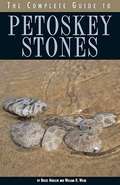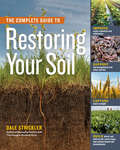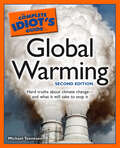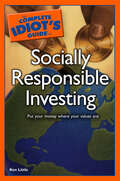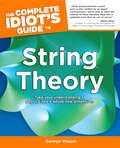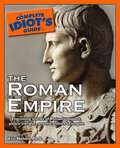- Table View
- List View
The Coming of Age of the Green Community: My neighbourhood, my planet (Routledge Explorations in Environmental Studies)
by Erik BichardPeople organising to protect their environment is not a new phenomenon, but the groups that have been pushing for environmental change since the 1970s have not convinced sufficient numbers make sustainable decisions or to lead sustainable lives. Governments have serially failed to do the job at the international level. Now, climate change, resource depletion and widening social aspirations threaten to destabilise human society unless sustainable change can be influenced from another direction. The Coming of Age of the Green Community explores the activities of a new generation of community-led initiatives that may herald the beginnings of the next wave of activism. Erik Bichard combines the testimonies of dozens of group activists with historic evidence and the views of a range of commentators from a variety of disciplines to put forward reasons why some green community groups succeed while others fail. He concludes with a valuable prescription for both existing and emerging groups on how to be sustainable, both over time and in their actions. This book address one of the key questions of the twenty-first century: has the local perspective on this universal concern finally come of age?
The Commercial Use of Biodiversity: Access to Genetic Resources and Benefit-Sharing (Routledge Library Editions: Ecology #15)
by Sarah A Laird Kerry Ten KateOriginally published in 1999 The Commercial Use of Biodiversity examines how biodiversity and the genetic material it contains are now as valuable resources. Access to genetic resources and their commercial development involve a wide range of parties such as conservation and research institutes, local communities, government agencies and companies. Equitable partnerships are not only crucial to conservation and economic development but are also in the interests of business and often required by law. In this authoritative and comprehensive volume, the authors explain the provisions of the Convention on Biological Diversity on access and benefit-sharing, the effect of national laws to implement these, and aspects of typical contracts for the transfer of materials. They provide a unique sector-by-sector analysis of how genetic resources are used, the scientific, technological and regulatory trends and the different markets in Pharmaceuticals, Botanical Medicines, Crop Development, Horticulture, Crop Protection, Biotechnology (in fields other than healthcare and agriculture) and Personal Care and Cosmetics Products. This will be an essential sourcebook for all those in the commercial chain, from raw material collection to product discovery, development and marketing, for governments and policy-makers drafting laws on access and for all the institutions, communities and individuals involved in the conservation, use, study and commercialisation of genetic resources.
The Common Agricultural Policy after the Fischler Reform: National Implementations, Impact Assessment and the Agenda for Future Reforms
by Alessandro Sorrentino Roberto HenkeProviding an updated state of the art report on the effects of the 2003 Common Agricultural Policy (CAP) reform, this volume has a particular emphasis on the governance of institutional changes and national/regional implementation. Written from an agricultural economist's point of view and enriched by the contribution of political scientists and policy makers, this book offers: - an updated report of the European debate on agricultural and rural policies; -an in-depth analysis of the decoupling process of the agricultural financial support in Europe; - an analysis of the CAP implementation in the old and new Europe Member States ; - a discussion on the future scenarios for the European Agricultural Policies Based on a selection of papers from the 109th Seminar of the European Association of the Agricultural Economists (EAAE), this book, with a foreword by Franz Fischler, also includes four commissioned contributions from leaders in the field including Sofia Davidova, Roberto Esposti, Tassos Haniotis and Johan Swinnen.
The Common Agricultural Policy: Past, Present and Future (Routledge Library Editions: Agribusiness and Land Use #14)
by Brian E. HillOriginally published in 1984, this book provides an introduction to the history of agriculture in Western Europe, states the case for government intervention and analyses the operation of the Common Agricultural Policy (CAP) during the late 20th Century. It concludes that the costs of the policy fell heavily on the poorer consumers, food prices were artificially high and surpluses sold at a loss on the world markets. In the light of Britain’s departure from the EU and the EU CAP this book, which also examined the prospects for the future has an enduring relevance.
The Common Agricultural Policy: Prospects for Change (Routledge Library Editions: Agribusiness and Land Use #20)
by Joan PearceOriginally published in 1981, at a time when the EEC’s Common Agricultural Policy had remained largely unchanged, this book examines the criticisms of the CAP and analyses the pressures emanating from the budget and the various options which were available for tackling them. It then outlines the approaches that individual member states and others were likely to adopt, and assesses whether the need for action on the budget will be used as an opportunity to revise the CAP.
The Common Fisheries Policy in the European Union: A Study in Integrative and Distributive Bargaining (Studies in International Relations)
by Eugénia da Condeição-HeldtThe purpose of this book is neither to duplicate overviews of the Common Fisheries Policy (CFP) nor to recapitulate narrative treatments of the European integration process. The aim is to comprehend how EU negotiations work theoretically and empirically so that a conceptual framework for analyzing EU international negotiations will be provided and juxtaposed to two key negotiations leading to the establishment of the CFP.
The Common Place: The Ordinary Experience of Housing (Design And The Built Environment Ser.)
by Peter KingMuch of what constitutes our experience of our immediate environment is quite ordinary and familiar, in particular, where we live. While policymakers and academics are constantly seeking transformations in housing, what we seek from our own housing is stability and lack of change. We seek secure roots to our lives rather than step-changes and radical reform. This book considers this ordinary experience of housing and how we come to depend upon it. The notion of the ordinary is used to argue against the conceits of policymaking and the fetish for domestic design. Using a variety of methods such as critical analysis and film criticism (looking at the work of film-makers as diverse as Bergman, Dreyer, Shyamalan, Tarkovsky, Tati and the Wachowski Brothers), it provides an original, impressionistic view of the role housing plays in our lives.
The Common Worlds of Children and Animals: Relational Ethics for Entangled Lives (Routledge Spaces of Childhood and Youth Series)
by Veronica Pacini-Ketchabaw Affrica TaylorThe lives and futures of children and animals are linked to environmental challenges associated with the Anthropocene and the acceleration of human-caused extinctions. This book sparks a fascinating interdisciplinary conversation about child–animal relations, calling for a radical shift in how we understand our relationship with other animals and our place in the world. It addresses issues of interspecies and intergenerational environmental justice through examining the entanglement of children’s and animal’s lives and common worlds. It explores everyday encounters and unfolding relations between children and urban wildlife. Inspired by feminist environmental philosophies and indigenous cosmologies, the book poses a new relational ethics based upon the small achievements of child–animal interactions. It also provides an analysis of animal narratives in children’s popular culture. It traces the geo-historical trajectories and convergences of these narratives and of the lives of children and animals in settler-colonised lands. This innovative book brings together the fields of more-than-human geography, childhood studies, multispecies studies, and the environmental humanities. It will be of interest to students and scholars who are reconsidering the ethics of child–animal relations from a fresh perspective.
The Commons in History
by Derek WallAn argument that the commons is neither tragedy nor paradise but can be a way to understand environmental sustainability.
The Commons in History: Culture, Conflict, and Ecology (History for a Sustainable Future)
by Derek WallAn argument that the commons is neither tragedy nor paradise but can be a way to understand environmental sustainability.The history of the commons—jointly owned land or other resources such as fisheries or forests set aside for public use—provides a useful context for current debates over sustainability and how we can act as “good ancestors.” In this book, Derek Wall considers the commons from antiquity to the present day, as an idea, an ecological space, an economic abstraction, and a management practice. He argues that the commons should be viewed neither as a “tragedy” of mismanagement (as the biologist Garrett Hardin wrote in 1968) nor as a panacea for solving environmental problems. Instead, Walls sees the commons as a particular form of property ownership, arguing that property rights are essential to understanding sustainability. How we use the land and its resources offers insights into how we value the environment.After defining the commons and describing the arguments of Hardin's influential article and Elinor Ostrom's more recent work on the commons, Wall offers historical case studies from the United States, England, India, and Mongolia. He examines the power of cultural norms to maintain the commons; political conflicts over the commons; and how commons have protected, or failed to protect ecosystems. Combining intellectual and material histories with an eye on contemporary debates, Wall offers an applied history that will interest academics, activists, and policy makers.
The Commons in an Age of Uncertainty: Decolonizing Nature, Economy, and Society
by Franklin Obeng-OdoomIn the last two hundred years, the earth has increasingly become the private property of a few classes, races, transnational corporations, and nations. Repeated claims about the "tragedy of the commons" and the "crisis of capitalism" have done little to explain this concentration of land, encourage solution-building to solve resource depletion, or address our current socio-ecological crisis. The Commons in an Age of Uncertainty presents a new explanation, vision, and action plan based on the idea of commoning the land. The book argues that by commoning the land, rather than privatising it, we can develop the foundation for prosperity without destructive growth and address both local and global challenges. Making the land the most fundamental priority of all commons does not only give hope, it also opens the doors to a new world in which economy, environment, and society are decolonised and liberated.
The Companion to Development Studies
by Vandana Desai Robert B. Potter Emil DaunceyThe Companion to Development Studies is essential reading in the field of development studies. This indispensable resource offers succinct, up-to-date, and insightful chapters that reflect the diverse voices and perspectives informing the field and the dynamic interplay of theory, policy, and practice that characterises it.This fourth edition brings together contributions from an impressive range of renowned international experts and emerging voices at the forefront of development studies to deliver engaging, interdisciplinary, and provocative insights into this challenging field. The 98 chapters spanning both theory and practice offer readers accessible discussions of the core issues, emerging trends, and key debates of the discipline. Divided into nine sections of: theories and their contentions; histories and discourses of development; actors and institutions; identities and practices; people and the planet; the economics of development; conflict, violence, and peace; the changing landscape of development; and approaches to policy and practice; this timely new text provides easy to use summaries of all the major issues encountered in this rapidly growing and changing field.The Companion serves students and scholars across various disciplines, including development studies, geography, politics, international relations, sociology, anthropology, and economics. It offers incisive analysis and critical insights, equipping those working in development policy and practice with the knowledge and understanding they need to navigate and address contemporary global challenges.This textbook is supported by flexible, online resources for teaching and learning such as tutorial guides, key concept videos, and a filmography.
The Companion to Development Studies, Third Edition
by Vandana Desai Rob PotterThe Companion to Development Studies contains over a hundred chapters written by leading international experts within the field to provide a concise and authoritative overview of the key theoretical and practical issues dominating contemporary development studies. Covering a wide range of disciplines the book is divided into ten sections, each prefaced by a section introduction written by the editors. The sections cover: the nature of development, theories and strategies of development, globalization and development, rural development, urbanization and development, environment and development, gender, health and education, the political economy of violence and insecurity, and governance and development. This third edition has been extensively updated and contains 45 new contributions from leading authorities, dealing with pressing contemporary issues such as race and development, ethics and development, BRICs and development, global financial crisis, the knowledge based economy and digital divide, food security, GM crops, comparative urbanism, cities and crime, energy, water hydropolitics, climate change, disability, fragile states, global war on terror, ethnic conflict, legal rights to development, ecosystems services for development, just to name a few. Existing chapters have been thoroughly revised to include cutting-edge developments, and to present updated further reading and websites. The Companion to Development Studies presents concise overviews providing a gateway to further reading and a flexible resource for teaching and learning. It has established a role as essential reading for all students of development studies, as well as those in cognate areas of geography, international relations, politics, sociology, anthropology and economics.
The Company Citizen: Good for Business, Planet, Nation and Community
by Tom LevittBusiness doing good is doing good business; this book learns from the era where governments ruled the world, pre-globalisation, and where business looked after itself, where issues like climate change, resource depletion and even poverty and hunger were not thought to be the responsibility of business. The Company Citizen concludes that not only are these key issues for business today but that the world will not be able to manage these issues without the active participation - even leadership - of business. Aware of the shortcomings of both government and civil society the author argues that environmental sustainability, economic and social inclusion and the better management of resources are all key issues for business and that it makes good business sense to manage them better. This book examines the case for the company citizen on a global, national and community level working alongside other. Never has the conscientious company citizen, as envisaged by 19th century Quaker philanthropists, been more needed; and never has that business case, one that justifies a long-term commitment to practical corporate behaviour for good, been more clear. Drawing attention both to the businesses that are taking the lead and those who are holding us back, the author concludes that only by involving business can we tackle the great issues of the day - and survive, as communities, nation and planet.
The Compleat Plattmaker: Essays on Chart, Map, and Globe Making in England in the Seventeenth and Eighteenth Centuries
by Norman J. W. ThrowerThis title is part of UC Press's Voices Revived program, which commemorates University of California Press’s mission to seek out and cultivate the brightest minds and give them voice, reach, and impact. Drawing on a backlist dating to 1893, Voices Revived makes high-quality, peer-reviewed scholarship accessible once again using print-on-demand technology. This title was originally published in 1978.
The Complete Bee Handbook: History, Recipes, Beekeeping Basics, and More
by Dr. Dewey M. CaronA guide to the history, behavior, and bounty of the humble bee From backyard keeping to bee-centric foods and home goods, there's no end to humankind's fascination with bees. The Complete Bee Handbook is a compelling read and easy-to-use reference, packed with practical and thought-provoking information for bee lovers new and old. Journey through the past, present, and future of the bee, including their evolution, their ever-critical role as pollinators, and the ongoing threats that jeopardize their survival. You'll also discover a short and sweet cultural history of beekeeping, the numerous applications of bee products, and tips on how you can support your local bee population. This bee guide explores: The life of the honey bee—Look into the mind of the hive as you learn about the role each bee plays in helping their colony function and thrive. Beekeeping for beginners—Get simple advice for cultivating a bee-friendly garden, from preferred plants to fun DIY accessories. Buzzworthy recipes—Try your hand at creative recipes for bee lovers, including mead, baklava, beeswax soap, and candles. Discover everything you wanted to know about bees with The Complete Bee Handbook!
The Complete Ecotopia
by Ernest Callenbach&“One of the most important utopian novels of the twentieth century that still has very important lessons to teach us. It will always convey to perfection the wild optimism of that moment: a feeling we need to recapture, adjusted for our time.&”—Kim Stanley Robinson on Ecotopia Collected in one handsome volume for the first time, The Complete Ecotopia presents an early classic of environmental science fiction in its entirety. Ecotopia (1975) and Ecotopia Emerging (1981), which paint detailed portraits of a healthier earth and a happier society, became foundational texts for a new wave of environmental activists, and they still contain an abundance of ideas yet to be realized. Ernest Callenbach’s Ecotopian saga anticipated climate fiction by more than a decade, sold approximately one million copies and was translated into one dozen languages, and predicted a host of innovations running from C-SPAN to widespread recycling. This edition includes two retrospective essays by the author, as well as an updated foreword by Heyday founder Malcolm Margolin. An important document of utopian ideas from the sixties and seventies, The Complete Ecotopia is also a stimulating read for environmentalists today—one that tells a bold, inventive, and adventurous story.
The Complete Guide to Climate Change
by Brian Dawson Matt SpannagleFor anyone trying to separate the fact from the fiction, The Complete Guide to Climate Change is an indispensable resource. Taking you through the A to Z of the key scientific, geographical and socio-political issues involved in the study of the environment and the implications of mankind’s effect upon it, topics covered include: environmental Science – the Carbon Cycle and the "Greenhouse Gases" the impacts of climate change on life, land and sea mitigation strategies from carbon capture to carbon taxes the Kyoto Protocol and UNFCC renewable fuel sources, from wind to solar power. Including guides to the latest scientific and governmental thinking on climate change, this book will tell you all you need to know about perhaps the biggest issue facing mankind today.
The Complete Guide to Petoskey Stones
by Bruce Mueller William H. WildeThe Complete Guide to Petoskey Stones is the authoritative guide for everyone who visits northern Michigan and can't wait to comb the beautiful beaches in search of Michigan's official state stone, the Petoskey. This book dispels myths about the Petoskey and reveals the true facts of this ancient fossilized coral. Instructive pictures and maps keep Petoskey fans on track every step of the way while guiding them to the best places to find the stone, including those favored by local Petoskey stone hunters and collectors. Once you've found a piece of the prized Michigan fossil, The Complete Guide to Petoskey Stones leads you through the many methods of polishing that bring this beautiful stone to life.
The Complete Guide to Restoring Your Soil: Improve Water Retention and Infiltration; Support Microorganisms and Other Soil Life; Capture More Sunlight; and Build Better Soil with No-Till, Cover Crops, and Carbon-Based Soil Amendments
by Dale StricklerHealthy soil is key to sustaining life on Earth. While more and more people are starting to see the need for soil restoration, there is very little understanding of just how it can be accomplished. There is a rapidly emerging demand for a &“how to&” manual for soil restoration. Dale Strickler is an expert on building healthy soil and restoring degraded soil, and in The Complete Guide to Restoring Your Soil, he presents the science of soil, along with proven methods of restoring depleted soil and agricultural practices from around the world that continue to build soil, rather than cause it to deteriorate. Strickler provides a solid foundation in the science of healthy soil, explaining how soil has become so degraded over time and the dire consequences for the human species, not just in terms of food scarcity but also the social, health, and environmental consequences of growing food in poor soil. He addresses the chemical, physical, and biological principles behind soil function, and presents actual farming practices that can be used to regenerate soil, techniques and strategies for remediating contaminated soil, and agriculture systems both past and present that functioned to build soil, such as the ancient chinampas systems of Mexico and the permaculture systems of today.
The Complete Idiot's Guide to College Biology: The Building Blocks of Biology—Explained
by Emily Jane WillinghamBiology is the study of life—the structure, function, growth, origin, and evolution of living things. Biology and chemistry work together to create what many people think of as "science." And passing Biology 101 in college is the entryway to further study in the sciences - if you can't do well in it, you aren't moving ahead. The Complete Idiot's Guide® to College Biology follows the curriculum to Biology 101 so closely that it serves as a perfect study guide to it, and it's also great for the AP Biology and SAT Subject Biology exams that high school students are taking in droves. Students can turn to it when their textbooks are unclear or as an additional aid throughout the semester. The guide covers: • Complicated processes such as photosynthesis and cellular respiration • Explanations of complex biology, from DNA to ecosystems • Offers online extras, including a chapter on microbes and an extended glossary Suitable for the new learner or as a refresher for former students, The Complete Idiot's Guide® to College Biology brings biology to the reader in a relaxed, accessible way.
The Complete Idiot's Guide to Global Warming, 2nd Edition: Hard Truths About Climate Change—and What It Will Take to Stop It
by Michael TennesenRevisiting the most important topic of our time The rapid warming of the Earth's climate has been a concern for decades. Though many of us understand that temperatures will-on average-rise, the science and the resulting social, economic, and political implications of such a change are far-reaching and complex. This new edition has been completely overhauled, synthesizing the latest information into an easy–to–read reference that provides a fair assessment of climate change, its costs, and even its short-term benefits.• Covers the newest science and issues surrounding global warming• Written by a seasoned science/nature journalist
The Complete Idiot's Guide to Socially Responsible Investing
by Ken LittleToday's hottest investing trend. More than ever, people want their money investments to reflect their personal or political leanings. But how do they find out which companies are "socially responsible?" Do these "green" investments perform as well as traditional investments? How can they protect themselves from mutual funds or 401Ks that are managed without the future in mind? All these questions and more are answered by an international expert who founded the SRI World Group, one of the largest information services on SRI. Includes detailed information about SRI, its history and where it's headed Explains the criteria used to evaluate a company's level of social responsibility Compares performance of SRI to traditional investments
The Complete Idiot's Guide to String Theory: Take Your Understanding of Physics into a Whole New Dimension!
by George MusserWe&’re living in the midst of a scientific revolution that&’s captured the general public&’s attention and imagination. The aim of this new revolution is to develop a &“theory of everything&”—a set of laws of physics that will explain all that can be explained, ranging from the tiniest subatomic particle to the universe as a whole. Here, readers will learn the ideas behind the theories, and their effects upon our world, our civilization, and ourselves.The Complete Idiot&’s Guide® String Theory explains how this exciting idea holds up against competing theories. In this Complete Idiot&’s Guide®, you get:• Clear explanation of quantum mechanics, Einstein&’s theories of relativity, and how string theory unites them. • A quick, easy-to-understand overview of competing theories and how they might be tested.• Fast facts about black holes, what&’s inside them, how they&’re made, and why they&’re so paradoxical. • Simple, smart tips to help you visualize extra dimensions.
The Complete Idiot's Guide to the Roman Empire
by Eric NelsonYou&’re no idiot, of course. The battle scenes in Gladiator had you on the edge of your seat and wondering where you could find more information on the rise and fall of ancient Rome. But so far, your search has left you feeling like a blundering barbarian.Pick yourself up off the coliseum floor! Consult The Complete Idiot&’s Guide® to the Roman Empire—a fun–to–read introduction to the fascinating history, people, and culture of ancient Rome. In this Complete Idiot&’s Guide®, you get:• The history of the Roman Empire&’s rise and fall.• An idiot-proof introduction to the great epic literature of the Roman Republic.• A survey of the Romans in arts and popular culture.• Fascinating details of some of history&’s most nefarious emperors, including Nero, Caligula, and Commodus.
